#climate activism
Text

Source
More of this
#government#environment#environmentalism#environmetalists#climate science#climate activism#news#current events#Europe#the left#progressive
19K notes
·
View notes
Text
hey uh so I haven't seen anyone talking about this here yet, but
the amazon river, like the biggest river in the fucking world, in the middle of the amazon fucking rainforest, is currently going through its worst drought since the records began 121 years ago
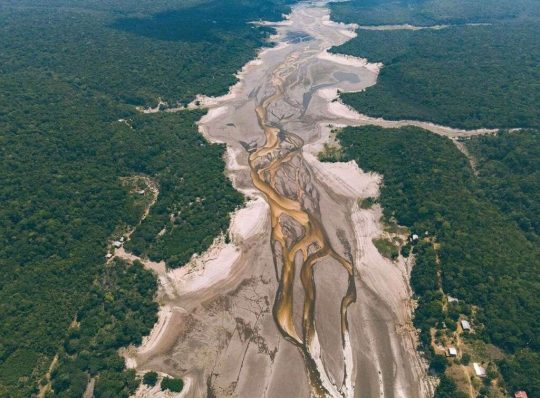
picture from Folha PE
there's a lot going on but I haven't seen much international buzz around this like there was when the forest was on fire (maybe because it's harder to shift the narrative to blame brazil exclusively as if the rest of the world didn't have fault in this) so I wanted to bring this to tumblr's attention
I don't know too many details as I live in the other side of the country and we are suffering from the exact opposite (at least three cyclones this year, honestly have stopped counting - it's unusual for us to get hit by even one - floods, landslides, we have a death toll, people are losing everything to the water), but like, I as a brazilian have literally never seen pictures of the river like this before. every single city in the amazonas state is in a state of emergency as of november 1st.
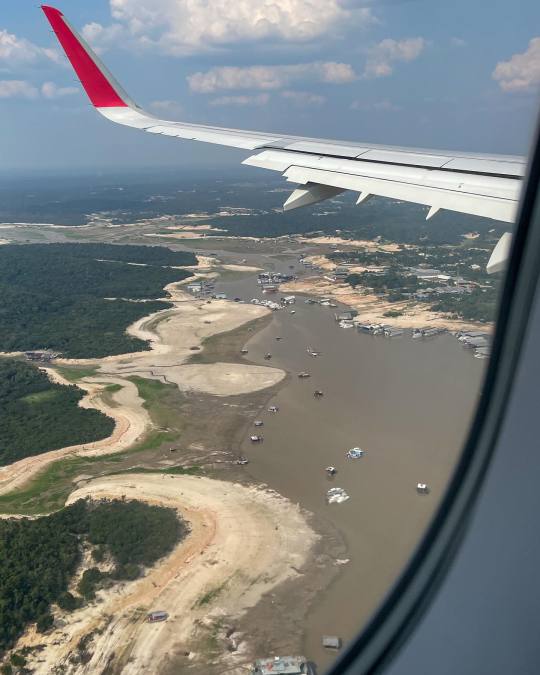
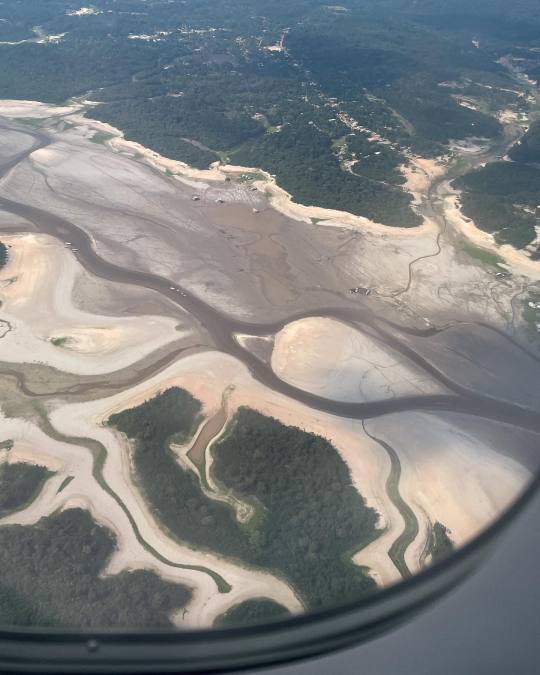
pictures by Adriano Liziero (ig: geopanoramas)
we are used to seeing images of rio negro and solimões, the two main amazon river affluents, in all their grandiose and beauty and seeing these pictures is really fucking chilling. some of our news outlets are saying the solimões has turned to a sand desert... can you imagine this watery sight turning into a desert in the span of a year?
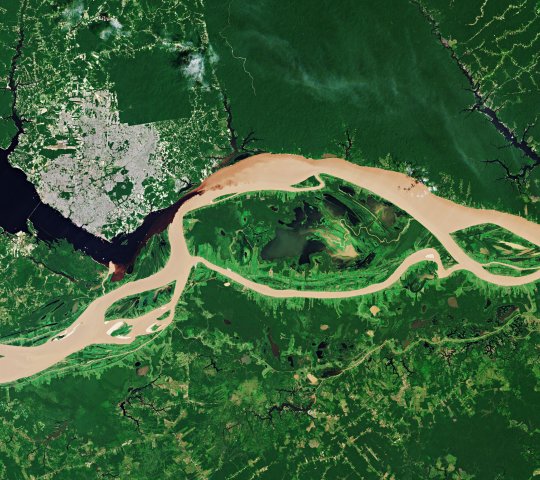
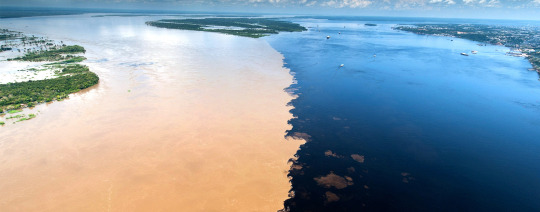
while down south we are seeing amounts of rain and hailstorms the likes of which our infrastructure is simply not built to deal with, up north people who have built everything around the river are at a loss of what to do.
the houses there that are built to float are just on the ground, people who depend on fishing for a living have to walk kilometers to find any fish that are still alive at all, the biodiversity there is at risk, and on an economic level it's hard to grasp how people from the northern states are getting by at all - the main means of transport for ANYTHING in that region is via the river water. this will impact the region for months to come. it doesnt make a lot of sense to build a lot of roads bc it's just better to use the waterway system, everything is built around or floats on the river after all. and like, the water level is so incomprehensibly low the boats are just STUCK. people are having a hard time getting from one place to another - keep in mind the widest parts of the river are over 10 km apart!!
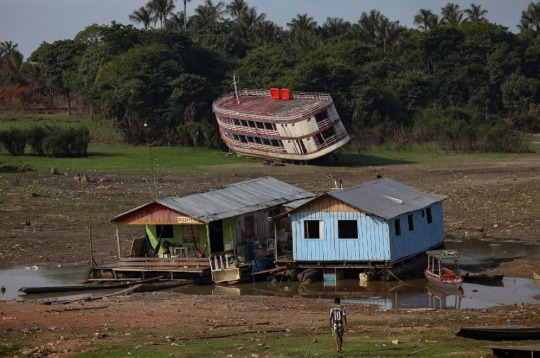
this shit is really serious and i am trying not to think about it because we have a different kind of problem to worry about down south but it's really terrifying when I stop to think about it. you already know the climate crisis is real and the effects are beyond preventable now (we're past global warming, get used to calling it "global boiling"). we'll be switching strategies to damage control from now on and like, this is what it's come to.
I don't like to be alarmist but it's hard not to be alarmed. I'm sorry that I can't end this post with very clear intructions on how people overseas can help, there really isn't much to do except hope the water level rises soon, maybe pray if you believe in something. in that regard we just have to keep pressing for change at a global level; local conditions only would not, COULD NOT be causing this - the amazon river is a CONTINENTAL body of water, it spans across multiple countries. so my advice is spread the word, let your representatives know that you're worried and you want change towards sustainability, degrowth and reduced carbon emissions, support your local NGOs, maybe join a cause, I don't know? I recommend reading on ecological and feminist economics though
however, I know you can help the affected riverine families by donating to organizations dedicated to helping the region. keep in mind a single US dollar, pound or euro is worth over 5x more in our currency so anything you donate at all will certainly help those affected.
FAS - Sustainable Amazon Fundation
Idesam - Sustainable Developent and Preservation Institute of Amazonas
Greenpeace Brasil - I know Greenpeace isn't the best but they're one of the few options I can think of that have a bridge to the international world and they are helping directly
There are a lot of other smaller/local NGOs but I'm not sure how you could donate to them from overseas, I'll leave some of them here anyway:
Projeto Gari
Caritás Brasileira
If you know any other organizations please link them, I'll be sure to reblog though my reach isn't a lot
thank you so much for reading this to the end, don't feel obligated to share but please do if you can! even if you just read up to here it means a lot to me that someone out there knows
also as an afterthought, I wanted to expand on why I think this hasn't made big news yet: because unlike the case of the 2020 forest fires, other countries have to hold themselves accountable when looking at this situation. while in 2020 it was easier to pretend the fires were all our fault and people were talking about taking the amazon away from us like they wouldn't do much worse. global superpowers have no more forests to speak of so I guess they've been eyeing what latin america still has. so like this bit of the post is just to say if you're thinking of saying anything of the sort, maybe think of what your own country has done to contribute to this instead of blaming brazil exclusively and saying the amazon should be protected by force or whatever
#solarpunk#sustainability#environmentalism#climate change#climate crisis#global warming#amazon rainforest#amazon river#geography#brazil#degrowth#punk#global boiling#ecopunk#anti capitalism#climate action#climate activism#the world does not die on my watch#i saw someone use that tag and uh i like it we should make it a thing#long post#:/ sorry i know no one likes lengthy bad news posts on their dashes but i've been thinking about this quite a bit#and i don't really know what to do to help bc i don't have money to donate and i am 10 thousand km away#i think i could be doing more to help but i am already trying my best#again dont feel obligated to share or read this but it would be nice and i would love you forever#have removed lbv from the post
7K notes
·
View notes
Text
Holy crap, I didn't think Biden would be able to get the Climate Corps established without Congress. This is SUCH fantastic news.
--
"After being thwarted by Congress, President Joe Biden will use his executive authority to create a New Deal-style American Climate Corps that will serve as a major green jobs training program.
In an announcement Wednesday, the White House said the program will employ more than 20,000 young adults who will build trails, plant trees, help install solar panels and do other work to boost conservation and help prevent catastrophic wildfires.
The climate corps had been proposed in early versions of the sweeping climate law approved last year but was jettisoned amid strong opposition from Republicans and concerns about cost.
Democrats and environmental advocacy groups never gave up on the plan and pushed Biden in recent weeks to issue an executive order authorizing what the White House now calls the American Climate Corps.
“After years of demonstrating and fighting for a Climate Corps, we turned a generational rallying cry into a real jobs program that will put a new generation to work stopping the climate crisis,” said Varshini Prakash, executive director of the Sunrise Movement, an environmental group that has led the push for a climate corps.
With the new corps “and the historic climate investments won by our broader movement, the path towards a Green New Deal is beginning to become visible,” Prakash said...
...Environmental activists hailed the new jobs program, which is modeled after the Civilian Conservation Corps, created in the 1930s by President Franklin D. Roosevelt, a Democrat, as part of the New Deal...
Lawmakers Weigh In
More than 50 Democratic lawmakers, including Massachusetts Sen. Ed Markey and New York Rep. Alexandria Ocasio-Cortez, had also encouraged Biden to create a climate corps, saying in a letter on Monday that “the climate crisis demands a whole-of-government response at an unprecedented scale.”
The lawmakers cited deadly heat waves in the Southwest and across the nation, as well as dangerous floods in New England and devastating wildfires on the Hawaiian island of Maui, among recent examples of climate-related disasters.
Democrats called creation of the climate corps “historic” and the first step toward fulfilling the vision of the Green New Deal.
“Today President Biden listened to the (environmental) movement, and he delivered with an American Climate Corps,” a beaming Markey said at a celebratory news conference outside the Capitol.
“We are starting to turn the green dream into a green reality,” added Ocasio-Cortez, who co-sponsored the Green New Deal legislation with Markey four years ago.
“You all are changing the world,” she told young activists.
Program Details and Grant Deadlines
The initiative will provide job training and service opportunities to work on a wide range of projects, including restoring coastal wetlands to protect communities from storm surges and flooding; clean energy projects such as wind and solar power; managing forests to prevent catastrophic wildfires; and energy efficient solutions to cut energy bills for consumers, the White House said.
Creation of the climate corps comes as the Environmental Protection Agency launches a $4.6 billion grant competition for states, municipalities and tribes to cut climate pollution and advance environmental justice. The Climate Pollution Reduction Grants are funded by the 2022 climate law and are intended to drive community-driven solutions to slow climate change.
EPA Administrator Michael Regan said the grants will help “communities so they can chart their own paths toward the clean energy future.”
The deadline for states and municipalities to apply is April 1, with grants expected in late 2024. Tribes and territories must apply by May 1, with grants expected by early 2025."
-via Boston.com, September 21, 2023
#climate change#climate crisis#climate anxiety#climate news#climate corps#biden#biden administration#democrats#voting matters#congress#environmental activism#environmental protection agency#environmental justice#climate activism#united states#us politics#good news#hope#hope posting#green jobs#hope punk#seriously this is SUCH a huge deal#climate hope#green energy#disaster preparedness#natural disasters#ecosystem restoration
6K notes
·
View notes
Text
youtube
Watch the American Climate Leadership Awards 2023 now: https://youtu.be/fenns4Pfq_A
@ecoAmerica was excited to announce the ACLA23 runner-up, Mothers Out Front! Mothers Out Front builds the power of mothers as an organized constituency to push for transformational change on climate and energy policy in the US. Watch the top ten finalists, Jane Fonda, Vanessa Hauc, Bill McKibben, and more in the ACLA23 Broadcast Recording!
#ACLA23#YouTube#climate leaders#climate solutions#climate action#climate and environment#climate#climate and health#climate blog#climate change#climate activism#climate justice#climate news#weather and climate#environmental news#environment#environmental awareness#environmental activism#environmental justice#environmental#environment protection#environment and health#environmental health#Youtube
16K notes
·
View notes
Text

Teach kids about climate change. Encourage friends and family to talk about it. Get involved with them. From now for the rest of our lives, we need to nurture deep ecological connections and ecological wealth.
-qbv
#queerbrownvegan#sustainability#climate change#mental health#eco anxiety#climate justice#environmentalism#climate crisis#activism#climate activism#intersectional environmentalism
2K notes
·
View notes
Text
ok so instead of going on my usual the earth is doomed spiral I started looking into solar punk solutions and stumbled across the practice of permaculture & found a free 50 video series from the university of oregon on it if anyone else would like to learn abt ways we can actually start restoring earths whole deal
2K notes
·
View notes
Text
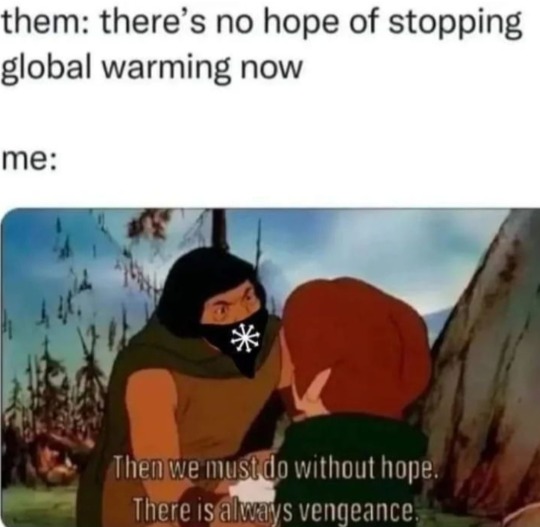
#politics#socialism#communism#anarchism#climate#anti capitalism#marxism#marxism leninism#capitalism#communist#climate crisis#climate activism#climate change#global warming#meme
1K notes
·
View notes
Text
Best Practices for Communicating about the Climate Crisis
Communication Tips
Keep it local. Focusing on bringing local solutions. You can lean into community pride to help motivate community action. And while climate change may have global impacts, emphasizing local climate impacts and benefits of local policies will resonate with more people, and feel more approachable/doable.
Stay focused on solutions. While the consequences of climate change are dire, focusing too much on how bad things could get tends to make people feel overwhelmed, hopeless and cynical – which doesn’t help them get or stay involved. Try not to give more than 1 or 2 examples of local consequences of environmental issues, then dive into how this work provides solutions.
Include your audience. Instead of using “I” or “you”, talk about what “we” need to do to turn things around. This includes using “we” when you’re talking about the government, when appropriate - after all, the government is meant to be for and of our communities.
Lean into moral values. Most people agree that we have a moral responsibility to protect our environment’s health, stability and safety for future generations, so don’t be afraid to talk about that or other values that resonate with you about this work.
Focus on tangible gains. Things like “the economy” are important, but they don’t feel as immediate as combating rising costs, protecting their and their neighbors' health, and saving money. Paint them a picture of the prosperous, stable, livable city we can create.
Project a can-do attitude. A lot of people are feeling let down by leadership at all levels, and feeling hopeless and helpless about making change. So, it’s important that you show that you and others are out here willing to really do the work - and there’s room for them to join in. Also, be sure to talk about successes.
Don’t waste time on opponents. We can't get everybody on our side. However, there are enough people that are excited about the prospect of living in a safe, sustainable community, where everyone has clean air to breathe/water to drink and a family-sustaining job that we don't need to convert opponents.
Encourage investment. Rather than framing the changes we want in terms of the drudgery of having to adapt to a bad situation, try to build excitement in the possibilities we can invest in - together. Everyone likes to feel they’re getting in on an exciting, cutting edge investment. Relatedly, be wary of statements that make people feel like they’re going to lose, rather than gain, options. Remind people that our current systems are not only unhealthy, dirty, and dangerous - they’re also ineffective.
Create immediate avenues for action. Once you’ve built up some excitement about what we can do, give people an immediate step they can take to help. Give that positive energy somewhere to go and show them how good it can feel to get involved.
Focus on what you want people to do, not what you want them to stop doing. This helps people envision change, and makes them less nervous.
Communicate respect. Keep away from stereotypes and harmful words. And when you talk about other people, be careful not to put words in their mouths.
Remember, you're not just combating ignorance, you're combating hopelessness, helplessness, and burnout!
2K notes
·
View notes
Text
“I don’t know of another time in history where so many courts in so many different levels all over the globe [have been] tasked with dealing with a similar overarching issue,” said Karen Sokol, law professor at Loyola University New Orleans College of Law.
Research also continues to unearth more about the fossil fuel industry’s knowledge of climate change. A January study revealed that Exxon had made “breathtakingly” accurate climate predictions in the 1970s.
The vast majority of climate-focused cases in the US have previously focused on the regulation of specific infrastructure projects, such as individual pipelines or highways, said Michael Gerrard, founder and faculty director of Columbia Law School’s Sabin Center for Climate Change Law.
But the new forms of climate litigation are different, as they grapple not with particular projects’ emissions, but on responsibility for the climate crisis itself. Sokol, who dubbed these new suits “climate accountability litigation”, says though they will not alone lower emissions, they could help reshape climate plans.
750 notes
·
View notes
Text
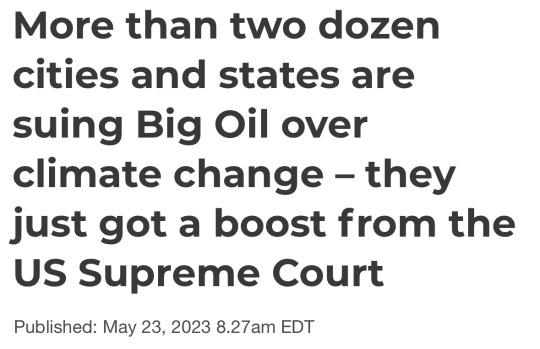
Source
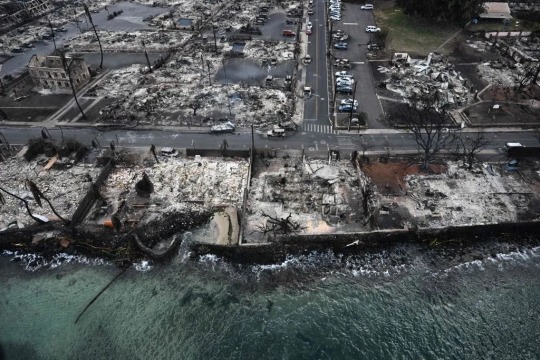
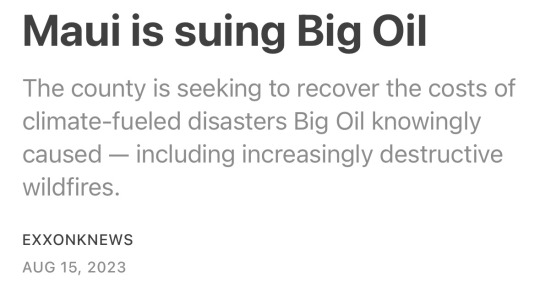
Source
Make them pay
#hawaii#politics#us politics#government#big oil#ban fossil fuels#environmentalism#environment#news#the left#progressive#current events#climate activism#climate justice#climate change
10K notes
·
View notes
Text
Tax the rich!
Be sure to follow us on all platforms!
Add Civic Cipher to your podcast favorites!
#civic cipher#fox news#cnn#global warming#climate activism#climate change#black lives matter#blm#defund the police#police brutality#police shooting#police chase#social security#congress#tax the rich#donald trump#trump#joe biden#Biden#ron desantis#conservative#conservatives#conservatism#liberals#liberal#liberalism#republican#republicans#republicanism#democrat
378 notes
·
View notes
Text
Hazel Chandler was at home taking care of her son when she began flipping through a document that detailed how burning fossil fuels would soon jeopardize the planet.
She can’t quite remember who gave her the report — this was in 1969 — but the moment stands out to her vividly: After reading a list of extreme climate events that would materialize in the coming decades, she looked down at the baby she was nursing, filled with dread.
“‘Oh my God, I’ve got to do something,’” she remembered thinking...
It was one of several such moments throughout Chandler’s life that propelled her into activist spaces — against the Vietnam War, for civil rights and women’s rights, and in support of environmental causes.
She participated in letter-writing campaigns and helped gather others to write to legislators about vital pieces of environmental legislation including the Clean Air Act and the Clean Water Act, passed in 1970 and 1972, respectively. At the child care center she worked at, she helped plan celebrations around the first Earth Day in 1970.
Now at 78, after working in child care and health care for most of her life, she’s more engaged than ever. In 2015, she began volunteering with Elder Climate Action, which focuses on activating older people to fight for the environment. She then took a job as a consultant for the Union for Concerned Scientists, a nonprofit science advocacy organization.
More recently, her activism has revolved around her role as the Arizona field coordinator of Moms Clean Air Force, a nonprofit environmental advocacy group. Chandler helps rally volunteers to take action on climate and environmental justice issues, recruiting residents to testify and meet with lawmakers.

Pictured: Hazel Chandler tables at Environment Day at Wesley Bolin Plaza in front of the Arizona State Capitol in Phoenix, Arizona, in January 2024.
Her motivation now is the same as it was decades ago.
“When I look my grandchildren and my great-grandchildren, my children, in the eye, I have to be able to say, ‘I did everything I could to protect you,’” Chandler said. “I have to be able to tell them that I’ve done everything possible within my ability to help move us forward.”
Chandler is part of a largely unrecognized contingent of the climate movement in the United States: the climate grannies.
The most prominent example perhaps, is the actor Jane Fonda. The octogenarian grandmother has been arrested during climate protests a number of times and has her own PAC that funds the campaigns of “climate champions” in local and state elections.
Climate grannies come equipped with decades of activism experience and aim to pressure the government and corporations to curb fossil fuel emissions. As a result they, alongside women of every age group, are turning out in bigger numbers, both at protests and the polls. All of the climate grandmothers The 19th interviewed for this piece noted one unifying theme: concern for their grandchildren’s futures.
According to research conducted by Dana R. Fisher, director for the Center of Environment, Community and Equity at American University, while the mainstream environmental movement has typically been dominated by men, women make up 61 percent of climate activists today. The average age of climate activists was 52 with 24 percent being 69 and older...
A similar trend holds true at the ballot box, according to data collected by the Environmental Voter Project, a nonpartisan organization focused on turning out climate voters in elections.
A report released by the Environmental Voter Project in December that looked at the patterns of registered voters in 18 different states found that after the Gen Z vote, people 65 and older represent the next largest climate voter group, with older women far exceeding older men in their propensity to list climate as their No. 1 reason for voting. The organization defines climate voters as those who are most likely to list climate change, the environment, or clean air and water as their top political priority.
“Grandmothers are now at the vanguard of today’s climate movement,” said Nathaniel Stinnett, founder of the Environmental Voter Project.
“Older people are three times as likely to list climate as a top priority than middle-aged people. On top of that, women in all age groups are more likely to care about climate than men,” he said. “So you put those two things together … and you can safely say that grandma is much more likely to be a climate voter than your middle-aged man.”
In Arizona, where Chandler lives, older climate voters make up 231,000 registered voters in the state. The presidential election in the crucial swing state was decided by just 11,000 votes, Stinnett noted.
“Older climate voters can really throw their weight around in Arizona if they organize and if they make sure that everybody goes to the polls,” he said.
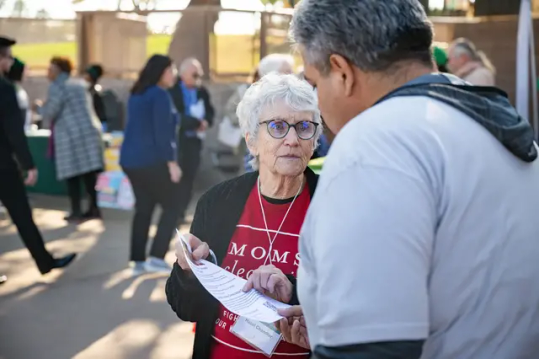
Pictured: Hazel Chandler’s recent activism revolves around her role as the Arizona field coordinator of Moms Clean Air Force, a nonprofit environmental advocacy group.
In some cases, their identities as grandmothers have become an organizing force.
In California, 1000 Grandmothers for Future Generations formed in 2016, after older women from the Bay Area traveled to be in solidarity with Indigenous grandmothers protesting the construction of the Dakota Access Pipeline at the Standing Rock Sioux Reservation.
“When they came back, they decided to form an organization that would continue to mobilize women on behalf of the climate justice movement,” said Nancy Hollander, a member of the group.
1000 Grandmothers — in this case, the term encompasses all older women, not just the literal grandmothers — is rooted at the intersection of social justice and the climate crisis, supporting people of color and Indigenous-led causes in the Bay Area. The organization is divided into various working groups, each with a different focus: elections, bank divestments from fossil fuels, legislative work, nonviolent direct actions, among others...
“There are women in the nonviolent direct action part of the organization who really do feel that elder women — it’s their time to stand up and be counted and to get arrested,” Hollander said. “They consider it a historical responsibility and put themselves out there to protect the more vulnerable.”
But 1000 Grandmothers credits another grandmother activist, Pennie Opal Plant, for helping train their members in nonviolent direct action and for inspiring them to take the lead of Indigenous women in the fight.
Plant, 66 — an enrolled member of the Yaqui of Southern California tribe, and of undocumented Choctaw and Cherokee ancestry — has started various organizations over the years, including Idle No More SF Bay, which she co-founded with a group of Indigenous grandmothers in 2013, first in solidarity with a group formed by First Nations women in Canada to defend treaty rights and to protect the environment from exploitation.
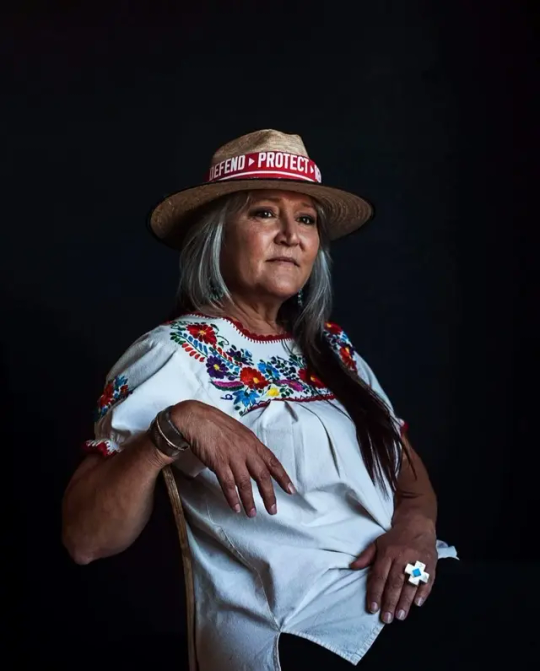
Pictured: Pennie Opal Plant has started various organizations over the years, including Idle No More SF Bay, which she founded in 2013 alongside Indigenous grandmothers.
In 2016, Plant gathered with others in front of Wells Fargo Corporate offices in San Francisco, blocking the road in protest of the Dakota Access Pipeline, when she realized the advantages she had as an older woman in the fight.
As a police liaison — or a person who aims to defuse tension with law enforcement — she went to speak to an officer who was trying to interrupt the action. When she saw him maneuvering his car over a sidewalk, she stood in front of it, her gray hair flowing. “I opened my arms really wide and was like, are you going to run over a grandmother?”
A new idea was born: The Society of Fearless Grandmothers. Once an in-person training — it now mostly exists online as a Facebook page — it helped teach other grandmothers how to protect the youth at protests.
For Plant, the role of grandmothers in the fight to protect the planet is about a simple Indigenous principle: ensuring the future for the next seven generations.
“What we’re seeing is a shift starting with Indigenous women, that is lifting up the good things that mothers have to share, the good things that women that love children can share, that will help bring back balance in the world,” Plant said...
[Kathleen] Sullivan is one of approximately 70,000 people over the age of 60 who’ve joined Third Act, a group specifically formed to engage people 60 and older to mobilize for climate action across the country.
“This is an act of moral responsibility. It’s an act of care. And It’s an act of reciprocity to the way in which we are cared for by the planet,” Sullivan said. “It’s an act of interconnection to your peers, because there can be great joy and great sense of solidarity with other people around this.”
-via The 19th, January 31, 2024
#climate change#climate activism#climate crisis#climate action#grandmother#older adults#elders#feminism#climate hope#family#intergenerational relationships#grandchildren#climate protest#good news#hope#hopepunk#environment#environmental activism#hope posting#boomers#gen z#age
745 notes
·
View notes
Text

Want to learn about the impacts of climate change on your community and how to encourage others to act? Take the free, virtual, self-paced Climate Ambassador training from Path to Positive Communities! Learn more and get started: https://pathtopositive.org/ambassadors-training/
#climate leaders#climate solutions#climate action#climate change#climate and environment#climate#climate blog#weather and climate#environmental#environment#environmental awareness#environment protection#climate activism#climate justice#environmental activism#environmental justice
10K notes
·
View notes
Text
So having a fossil fuel executive as the president of the UN Climate Summit is going about as well as expected

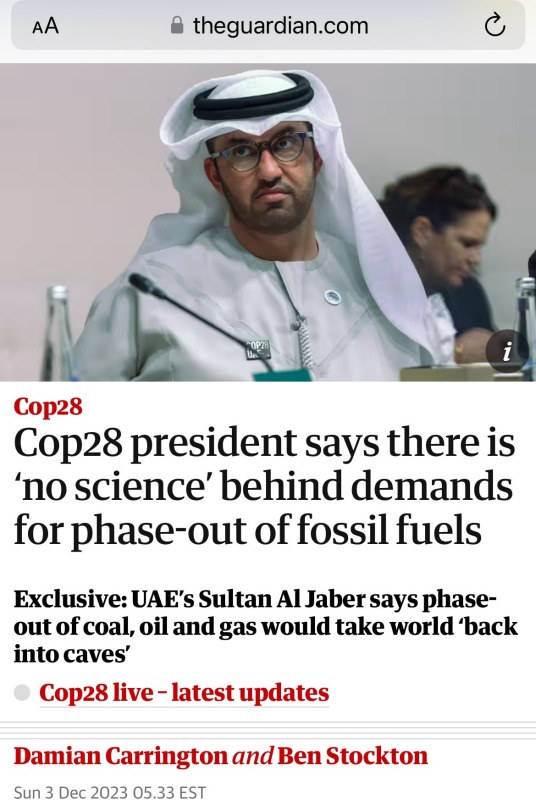
Fossil fuel companies and the politicians they employ are murderers. And they should be treated as such.
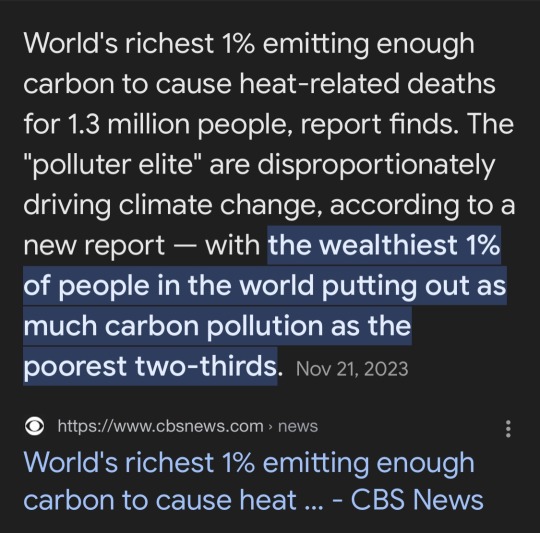
Abolish billionaires. Ban private jets & mega yachts. Invest in renewable energy and stop listening to politicians and corporations over scientists.
#cop28#climate change#capitalism#eat the rich#climate crisis#wealth inequality#late stage capitalism#us politics#climate emergency#climate activism#joe biden#climate science#fossil fuels#climate justice#climate news#climate solutions#tax the rich#abolish billionaires
292 notes
·
View notes
Text
People are so shook and making memes about the haze in New York only they just found out about it from New York.
Just because it was in New York.
They're not talking about anywhere else, only in America. So many Canadian cities looked/look exactly the same as New York rn. Alberta's cities are some of them, and it looked horrific. Alberta was the first province affected, and they started in April/May! no one talked ab it!
I see so many memes on social media about how Canada "gave" America the haze, how "Americans are suffering because of Canada", how the "Canadian wildfires are making American cities orange".
20,000 Canadians were forced to leave their homes. 9.4 million acres burned. And yes, cities all over Canada have been washed orange, as are New York and Detroit and other American cities. NY had the worst air quality in the world yesterday, and they absolutely have every right to be scared and to complain ab it. Think of the sick, the children, pregnant ppl. Millions of animals and flora will perish. My friends, family, and I are extremely worried. We are all worried. This is the earliest fire season I remember.
This is all because of climate change. Something that affects all of us. Why people are making fun of Canada for such a natural disaster is beyond me. So much land, land that INDIGENOUS PPL HAVE WORKED SO HARD TO PROTECT, is gone.
This isn't a joke.
Stop joking.
#canada#im sick fr#climate change#wildfires#canadian wildfires#new york#canadian politics#american politics#climate activism#hermie's rants#activism#America#boost#signal boost#ny#nyc#climate crisis
543 notes
·
View notes
Text
Connecting on Climate
Often, I think we need to shift the climate and biodiversity crises discussions from facts to stories.
Why choose native trees and plants?
Well, do you remember how bugs splatted on your windshield decades ago compared to now?
Do you remember the fireflies of childhood?
After we notice, after we link these ideas to our personal stories, then it's time to cultivate questions.
Who else misses these insects?
What about plants with absent pollinators.
What about bats and birds missing their food?
Our kids missing constellations of fireflies?
We link to personal stories.
We foster the follow-up questions.
Then, we reject abstraction and hopelessness. We reject all or nothing thinking and tie our concerns to concrete things we CAN do.
We teach the immense power of doing something even when we can't do everything.
There is so much we do not control.
Yet, we do control some things.
We have agency.
Perhaps you can plant a white oak and learn/notice who benefits.
Perhaps you can reject lawn and cultivate native plants.
Perhaps you can volunteer or donate or reject damaging products. People care when the issue at hand feels like a part of their own story. People continue to care when they believe they have the power to participate in shaping the story's future.
We need to get creative and bring the facts home to people's stories, to their sense of self, but the good news is the truth is a wind at our backs.
Our environment IS a part of everyone's personal story and our individual actions can/do shape the future of our planet.
1K notes
·
View notes